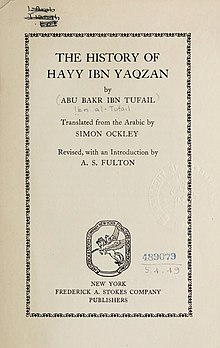
Back حي بن يقظان Arabic El filòsof autodidacte Catalan Der Philosoph als Autodidakt German La aŭtodidakta filozofo Esperanto El filósofo autodidacta Spanish حی بن یقظان Persian Hayy ibn Yaqdhan French Hayy ibn Yaqzhan ID Hey bin Yeqzan Kurdish Hayy ibn Yaqdhan Malay
This article needs additional citations for verification. (January 2018) |
 Frontispiece of the Simon Ockley translation from 1708 (re-published in 1929) | |
| Author | Ibn Tufail |
|---|---|
| Original title | حي بن يقظان |
| Language | Arabic |
| Genre | Philosophy |
Publication date | around 1160 CE (555 AH) |
Ḥayy ibn Yaqẓān (Arabic: حي بن يقظان, lit. 'Alive son of Awake'; also known as Hai Eb'n Yockdan[1]) is an Arabic philosophical novel and an allegorical tale written by Ibn Tufail (c. 1105 – 1185) in the early 12th century in al-Andalus.[2] Names by which the book is also known include the Latin: Philosophus Autodidactus ('The Self-Taught Philosopher'); and English: The Improvement of Human Reason: Exhibited in the Life of Hai Ebn Yokdhan. Ḥayy ibn Yaqẓān was named after an earlier Arabic philosophical romance of the same name, written by Avicenna during his imprisonment in the early 11th century,[3] even though both tales had different stories.[4] The novel greatly inspired Islamic philosophy as well as major Enlightenment thinkers.[5] It is the third most translated text from Arabic, after the Quran and the One Thousand and One Nights.[6]
- ^ Ibn Ṭufayl, Muḥammad ibn ʻAbd al-Malik; Bacon, Ed; Ashwell, George; Pococke, Edward (1686). The history of Hai eb'n Yockdan, an Indian prince: or, The self-taught philosopher. London: Printed for R. Chiswell etc.
- ^ Kukkonen, Taneli (November 2016). "Ibn Ṭufayl's (d. 1185) Ḥayy ibn Yaqẓan". In El-Rouayheb, Khaled; Schmidtke, Sabine (eds.). The Oxford Handbook of Islamic Philosophy. doi:10.1093/oxfordhb/9780199917389.013.35. ISBN 978-0-19-991738-9. Retrieved 2 January 2018.
- ^ Nasr, Seyyed; Leaman, Oliver (1996). History of Islamic philosophy. Routledge. p. 315. ISBN 0415131596.
- ^ Davidson, Herbert Alan (1992). Alfarabi, Avicenna, and Averroes, on Intellect Their Cosmologies, Theories of the Active Intellect and Theories of Human Intellect. Oxford University Press. p. 146. ISBN 9780195074239.
- ^ Cite error: The named reference
Russell-228was invoked but never defined (see the help page). - ^ "Desert island scripts". The Guardian. 22 March 2003. Retrieved 23 June 2021.